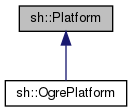|
|
| Platform (const std::string &basePath) |
| |
|
void | setCacheFolder (const std::string &folder) |
| | set the folder to use for shader caching
|
| |
|
|
std::string | mCacheFolder |
| |
|
Factory * | mFactory |
| |
|
|
class | Factory |
| |
|
class | MaterialInstance |
| |
|
class | ShaderInstance |
| |
|
class | ShaderSet |
| |
◆ fireMaterialRequested()
| MaterialInstance* sh::Platform::fireMaterialRequested |
( |
const std::string & |
name, |
|
|
const std::string & |
configuration, |
|
|
unsigned short |
lodIndex |
|
) |
| |
|
protected |
fire event: material requested for rendering
- Parameters
-
| name | material name |
| configuration | requested configuration |
◆ supportsMaterialQueuedListener()
| virtual bool sh::Platform::supportsMaterialQueuedListener |
( |
| ) |
|
|
protectedvirtual |
this will be true if the platform supports a listener that notifies the system whenever a material is requested for rendering. if this is supported, shaders can be compiled on-demand when needed (and not earlier)
- Todo:
- the Factory is not designed yet to handle the case where this method returns false
Reimplemented in sh::OgrePlatform.
◆ supportsShaderSerialization()
| virtual bool sh::Platform::supportsShaderSerialization |
( |
| ) |
|
|
protectedvirtual |
this will be true if the platform supports serialization (writing shader microcode to disk) and deserialization (create gpu program from saved microcode)
Reimplemented in sh::OgrePlatform.
The documentation for this class was generated from the following file:
 Inheritance diagram for sh::Platform:
Inheritance diagram for sh::Platform:
 1.8.13
1.8.13